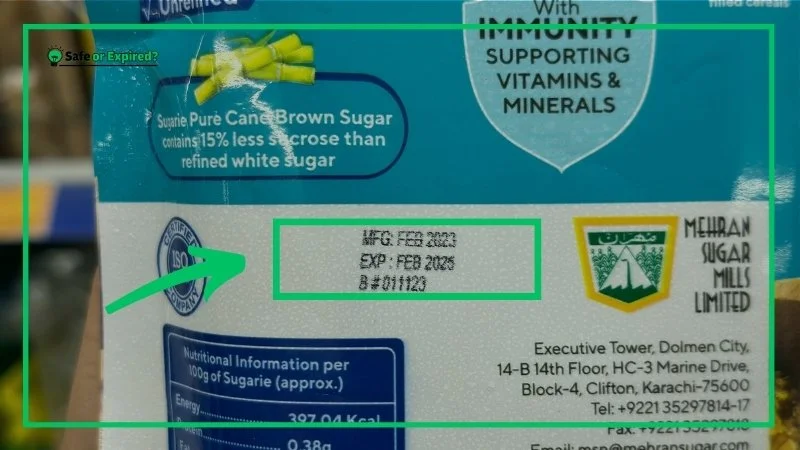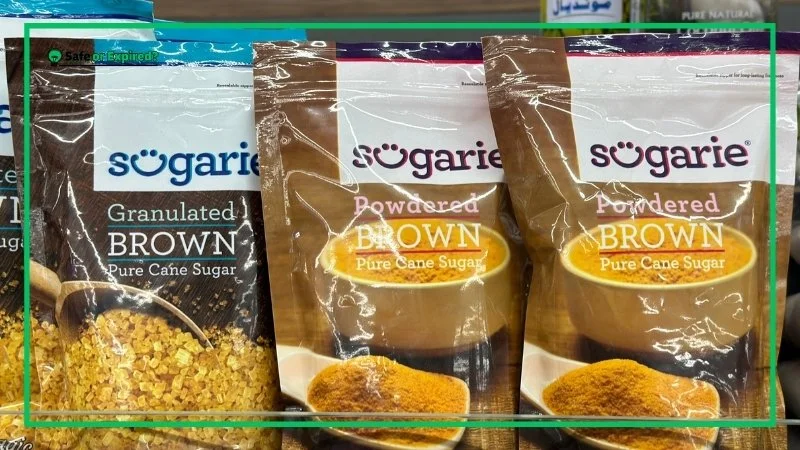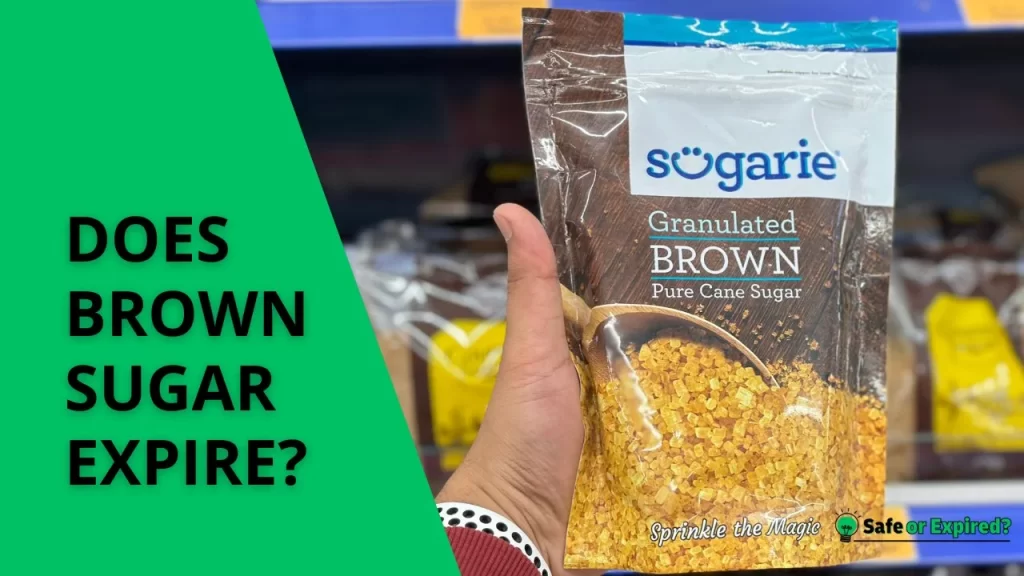“Does brown sugar expire?” is a question that pops up as we dig through our baking supplies and find that hard lump of brown sugar we bought ages ago. Yes, it does expire, but learning when it happens is crucial. Don’t go anywhere; this guide will teach you all the details about brown sugar expiration. Keep reading.
Does Brown Sugar Expire? Know the Details
Yes, brown sugar does expire, but it takes a long while before it’s considered unsuitable for consumption. If stored improperly, it can harden or grow mold. However, brown sugar has an incredibly long shelf life when stored correctly, often lasting well beyond its “best by” date.
But what is this “storing improperly?” Well, whether you’ve put it on the counter or in the fridge. Similarly, opened or packaged brown sugar also has different expiration. You may wonder, “When Does Unopened Brown Sugar Expire?” and “How long does brown sugar last after opening?” Let’s see the details.
How Long Does Brown Sugar Expire? Opened vs Unopened
Unopened brown sugar, when stored properly, can remain fresh for years. Technically, it doesn’t expire in the way perishable foods do. The “best by” date on the packaging is more about quality assurance than safety. Over time, brown sugar may harden, but this doesn’t mean it’s expired. It’s still safe to use, and there are simple tricks to soften it again.
You should check the package before opening it. If there’s time left and there is no visible damage, then you can consume it without worries.

Now, what about how long does brown sugar last after opening? Once opened, brown sugar’s shelf life depends on how well it’s stored. If you keep it in an airtight container away from heat and moisture, it can last indefinitely.
The main issue with opened brown sugar is it loses its soft, moist texture and becomes hard. However, this doesn’t render it inedible. To prevent hardening, some people add a slice of bread or a marshmallow to the container to keep the sugar soft.
Brown Sugar Expiry: Fridge vs No-Fridge
Storing brown sugar in the fridge or freezer is a common query. While it’s not necessary, doing so can extend its useful life, especially in humid environments. The key is to ensure it’s in a completely airtight container to prevent moisture from getting in or out.
People also ask, “Does Brown Sugar Expire in the Freezer?” Freezing brown sugar can preserve its quality for years. Since sugar doesn’t freeze solid, it can be used directly from the freezer without thawing.
This method is particularly useful for those who don’t use brown sugar frequently and want to maintain its quality for occasional baking projects. Remember, the enemy of brown sugar is not time but improper storage. By controlling exposure to air and moisture, your brown sugar can remain a reliable pantry staple indefinitely.
| Storage Location | Opened | Un-Opened |
| Counter | It can last indefinitely if stored correctly (away from moisture and heat). | Same as opened, with the potential to last slightly longer due to reduced exposure to air. |
| Fridge | Not necessary but can help to extend freshness in very humid environments. Store in an airtight container to prevent sugar from absorbing fridge odors. | Similar to opened, with the added benefit of reduced exposure to environmental changes. |
Sugar, in its many forms, is a staple in baking and cooking, but it’s not the only ingredient or snack we might worry about expiring.
Take, for instance, Ferrero Rocher chocolates. Known for their decadent layers and nutty center, these chocolates are a favorite during holidays and special occasions. But do they last as long as we hope, or is there a ticking clock on their freshness? For a closer look at how Ferrero Rocher compares to other chocolates in terms of expiration, check out this article “Does Ferrero Rocher Expire? Comparison with Other Chocolates”.
How To Know If Brown Sugar Is Bad? (Things to Look for)
To know if brown sugar is bad, look for mold growth or an odd smell, which are rare but clear signs of spoilage. Usually, hardening isn’t a spoilage indicator but a moisture loss sign. If brown sugar appears normal with its sweet, molasses-like scent intact, it’s still good to use.
Check the Printed Expiry Date
Although brown sugar can last indefinitely under ideal storage conditions, it’s always a good idea to start by checking the printed expiry date on the package. This date is a good indicator of when the manufacturer guarantees the product will retain its best quality.

Keep in mind that while brown sugar may still be safe to consume after this date, its quality, texture, and flavor could begin to diminish.
Look for Mold Growth
The most obvious sign that brown sugar has gone bad is the presence of mold. Although it’s rare, brown sugar can develop mold if exposed to moisture for an extended period. If you see any unusual spots or growths, it’s best to discard the entire amount.
Check for Odors
Brown sugar should have a sweet, slightly molasses-like scent. If your sugar smells sour or off in any way, this could indicate contamination or exposure to unwanted odors. Sugar can absorb smells from its environment, affecting its taste and quality.
Assess the Texture
While hardening of brown sugar isn’t necessarily a sign of spoilage (it’s more about moisture loss), extremely hard sugar that doesn’t soften with the usual tricks (like placing a piece of bread or an apple slice in the container) may have lost its quality. If it turns into a solid rock, it’s past its prime for most culinary uses.
Taste Test a Tiny Amount
If your brown sugar passes the visual and smell tests, tasting a tiny bit can be the final check. It should taste sweet and rich. If it tastes off or has a strange aftertaste, it’s better not to use it. Remember, this step is only for sugar that shows no signs of mold.
Now, you can ensure your brown sugar is always fresh for your cooking and baking needs.
How Long Does Brown Sugar Last After Expiration Date? Deadline
Brown sugar can last indefinitely after its “best by” or expiration date if you focus on its storage. This longevity is due to sugar’s natural preservative properties inhibiting bacterial growth. However, while it won’t become unsafe to eat, its quality might decline over time.
Proper storage means keeping it in a cool, dry place, away from moisture, and in an airtight container to prevent it from hardening.

If stored under these conditions, brown sugar can maintain its best quality for years beyond its printed date. However, it’s not uncommon for it to remain usable well past this period, with some simple restoration methods available for hardening issues.
And what about those colorful, fun M&Ms? We’ve all had a bag or two sitting around, maybe forgotten for a bit longer than we’d like to admit. Do M&Ms stand the test of time, or do they have a shelf life we should be mindful of to enjoy them at their best? Dive into “Do M&Ms Expire? Keeping Your Favorite Treats Fresh & Tasty” for tips on how to keep your M&Ms delicious and ready for snacking.
Is It Okay To Eat Expired Brown Sugar? (Know Now)
Yes, it’s generally okay to eat expired brown sugar. Unlike perishable foods that can spoil and pose health risks, brown sugar’s shelf life is quite forgiving. The reason behind this is simple: sugar is a natural preservative. Its high osmotic pressure can prevent the growth of microorganisms.
Therefore, brown sugar, even when “expired,” doesn’t harbor bacteria or fungi easily, making it safe for consumption long after its date indicated.
What Happens if You Eat Expired Sugar?
Eating expired sugar is generally considered safe. Sugar, by its very nature, doesn’t harbor bacteria or other pathogens that can cause foodborne illness due to its low moisture content and high osmotic pressure, which creates an inhospitable environment for microbial growth.
These are the potential issues with expired sugar:
Taste and Texture Changes: While not a safety concern, the texture of sugar can change over time. Hardened or clumpy sugar might affect the outcome of recipes, especially where texture is crucial. However, these issues can often be resolved (e.g., clumps can be broken down or dissolved).
Contamination Risks: The primary risk with expired sugar comes from improper storage. If sugar is stored in an unclean container or in a humid environment, there is a slight risk of contamination with pests or absorbing odors, which could affect its purity and taste.
Mold Growth: Very rarely, if sugar is exposed to moisture, it might develop mold. Consuming moldy sugar could pose health risks, similar to eating any moldy food product.
FAQs
Does White Sugar Expire?
White sugar, much like brown sugar, does not truly “expire” in the way that perishable foods do. It has an indefinite shelf life if stored properly in a dry, cool place. The lack of moisture and high sugar content prevents the growth of pathogens, ensuring that white sugar remains safe to use indefinitely. The key factor is preventing contamination and keeping it away from strong odors, as sugar can absorb smells.
Does Brown Sugar Go Bad When It Hardens?
Hardening is a common issue with brown sugar, but it doesn’t mean it has gone bad. Brown sugar hardens when it loses its natural moisture. This process is reversible and does not affect the sugar’s safety or edibility. To soften hardened brown sugar, you can use methods like placing a damp paper towel over it for a few seconds in the microwave or storing it with a slice of bread or an apple slice in an airtight container to restore its moisture.
Does Brown Cane Sugar Go Bad?
Brown cane sugar does not go bad in the sense of becoming unsafe. It can last indefinitely when stored correctly in a dry and cool environment. The main concerns with brown cane sugar involve quality issues such as hardening or clumping, which can be managed with proper storage techniques. Mold growth is extremely rare, but it would clearly indicate that sugar should not be used.
Conclusion
You learn all about the shelf life of brown sugar in this ultimate guide. Let’s recap the sweet facts:
- Brown sugar doesn’t expire in the traditional sense, but it can harden over time due to moisture loss.
- It’s generally okay to eat expired brown sugar.
- Proper storage is key for maintaining sugar quality, requiring a cool, dry place away from odors.
Remember, brown sugar is more resilient than you might think. So, use it without worries and sweeten the moments of your life.

